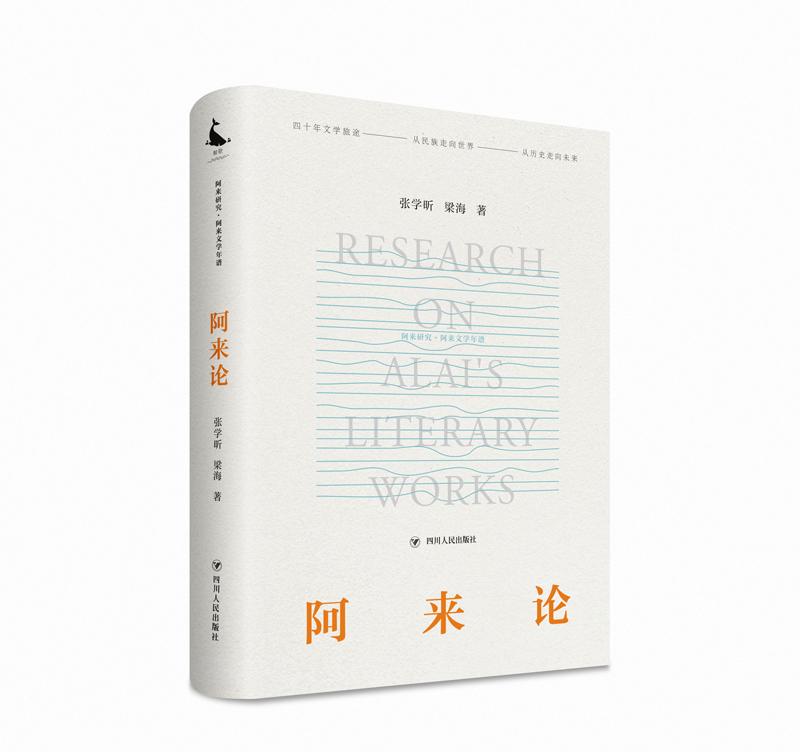The famous writer and winner of the Mao Dun Literature Prize, Alai, once again mentioned his poem "Roaming the Ruoerge Steppe at the Age of 30" that he composed 32 years ago. At that time, he was a little confused, but he did not give up observing life, observing the times, and has been writing until now... He probably would not have imagined that after many years, he would also become the object of "observation" - on October 18, near the end of the Tianfu Book Fair, a new work "Alai Theory" that was not written by Ah Lai but was closely related to him was launched.

In addition to bringing a review of Alai's creative career in the book, the two well-known literary critics also analyzed and explained the reason why Alai became "Alai" in combination with his classic masterpieces, rather than the uniqueness of other writers.
The two authors who brought "The Theory of Alai" this time are Zhang Xuexin, a professor at the College of Literature of Liaoning Normal University, whose research direction is Modern and Contemporary Chinese Literature and has won the first "Contemporary Chinese Literary Critic Award"; the other critic Liang Hai is a professor and doctoral supervisor of the Department of Humanities of Dalian University of Technology, mainly engaged in literary criticism and Chinese modern and contemporary literature research.
Professor Liang Hai, one of the authors, told reporters that he was initially shocked by Alai's masterpiece "Dust Settled", "I sensed a poetic spectacle in his work." After that, she began a follow-up study of Alai: an in-depth interpretation of the works, and supplemented the Annals of Alai literature. Professor Zhang Xuexin's entry point is biased towards professionalism. Those included in the "Treatise on Alai", such as "Simple Poetry - On the Short Stories of Alai", "Our Souls Need Beauty - Reading Alai's Novel "In the Clouds"", "Mythological Restatement at the End of History - On Alai's "King Gesar"", etc., are all relatively standard literary criticism styles. He also praised ah lai's perception of natural history and life in particular. Zhang Xuexin believes that Alai's works, reading and researching have benefited people a lot.
Before writing, the two of them followed Alai as a "sample" for many years. Because of this, when he heard that he had become a "sample", Alai also laughed with the reporter, feeling like being put into a glass bottle for people to study.
The treatment of being "observed" this time reminded Alai of the first thing that came to mind was the "Roaming the Ruoerge Steppe at the Age of 30" mentioned at the beginning of this article. In August this year, when he came to Chongqing to give a lecture, he also mentioned this work that he wrote in 1989. "Actually, at that time, I was a little confused about writing." Ah said, what I think a lot about is whether to write it or not, and how about writing it? "In the past, literary theory also said that the earth will give you the answer, so I tried it. I spent two months hiking around the prairie. The first day there was no answer, the second day did not, the third day did not, but walking more, alone slowly found this feeling, this feeling is the confidence that I can always write in my life. Alai concluded that the core of this faith is love, including the love of relatives, the love of the opposite sex, the love of human beings, the love of the land, and the love of mountains and rivers.
Up to now, Alai has been writing for 40 years. In his view, as long as he is full of love for life, that is, the affirmation of his own life, he can use literature to build himself. For example, he specifically mentioned that he faced the negative side of human nature in his writing, not to expose ugliness, but to hope that society would heal these imperfections.
As when he came to Chongqing before, Ah Lai once again mentioned that he was actually "not ambitious" in writing. "But I hope that every book I can bring a little progress, a little expansion." Either a small advance in writing technology, or some expansion of the level of social knowledge. ”
For a long time, there is a problem in the literary world that has been discussed for many years: there is a dialectical relationship between the form and content of literary works. "The writer is constantly searching between these two possibilities, and literature moves forward step by step."
Upstream journalist Qiu Jinyi